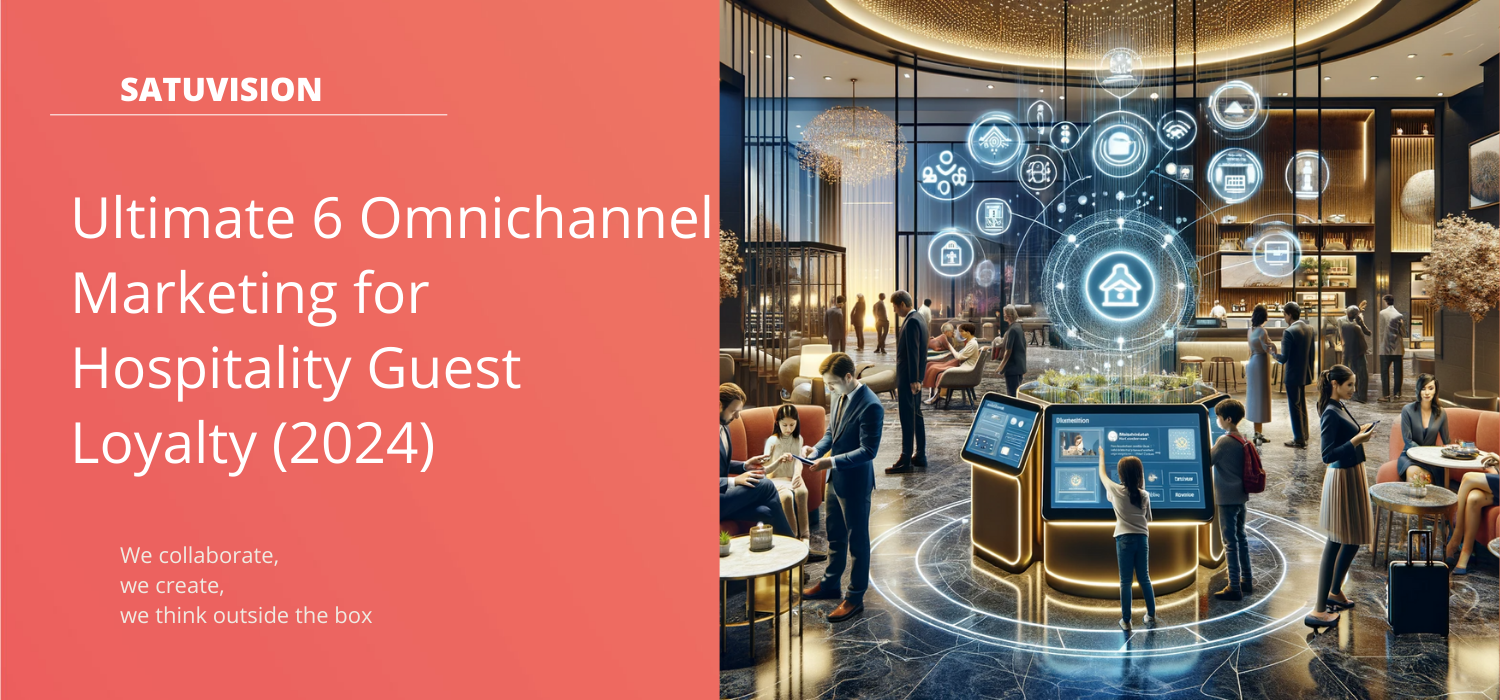Innovative Omnichannel Marketing for Guest Loyalty in the Hospitality Industry (2024)
The hospitality industry stands at a consequential crossroads today. With evolving customer expectations and technological advancements, the sector is rapidly transforming and competing to provide its guests with the best and most personalized customer experience.
A recent study from the 2023 State of Omnichannel Marketing report, companies that embrace an omnichannel marketing strategy increase their ROI by 32% compared to those that don’t – and yes, this applies to the hospitality industry.
To increase ROI from omnichannel marketing, the hospitality industry must focus on improving guest experience, which leads to more sales and customer retention.
In this blog post, you will learn about the benefits of omnichannel marketing for enhancing guest experiences in the hospitality sector with its innovative marketing strategies that integrate digital and physical touchpoints, personalize guest interactions, and leverage technology to create a seamless customer journey. So, sit back and explore the world of omnichannel marketing in hospitality!
Table of Contents
Defining Omnichannel for the Hospitality Industry & Its Misunderstanding
Let’s first discuss the meaning of Omnichannel marketing. Omnichannel marketing refers to providing a seamless and customized experience to your customers across all channels, from the stage of considering the experience until the end of their journey.
The goal of Omnichannel marketing is to create:
- Happier guests
- More bookings
- Stronger reputation for your hotel
The current misunderstanding about Omnichannel marketing is that many people believe they are implementing it by simply uploading promotions on their website, social media, or email.
Omnichannel marketing goes far beyond using all available online and offline marketing platforms. It’s a holistic approach that integrates all customer touchpoints across those platforms to create a seamless and positive customer experience.
With our experience, we have identified some key indicators that can help determine whether you have optimally implemented omnichannel marketing correctly or not:
- Workflows on each channel of marketing are optimized
- You are optimizing data integration
- You have a documented omnichannel strategy
- You are continuously testing and iterating
- You have a customer-centric culture
So, has your hospitality business already implemented it?
Benefit of Implementing Omnichannel Marketing [2024]
More and more companies are adopting this marketing strategy to enhance interactions with customers. Here are some of them:
Enhanced Customer Satisfaction
Customer satisfaction rates are 23 times better for businesses using omnichannel strategies. It’s understandable that in the implementation of omnichannel marketing, brands pay attention to every detail of customer interaction.
In omnichannel marketing, communication channels ensure a seamless transition from providing accurate product information to payment. This approach means that whether customers are learning about a product, asking questions, or making a purchase, they receive a consistent and straightforward experience across all platforms.
This way, it ensures that every step, from information discovery to completing a purchase, is integrated and coherent, making it easier for customers to proceed without confusion or hassle.
By providing a seamless and consistent experience across all channels, customers will be more satisfied with the services provided. As a result, consumer trust will increase, and the risk of disappointment can be avoided.
Increased Room Occupancy
Omnichannel marketing has been proven to enhance hotel room occupancy by ensuring guests receive a complete and smooth experience across all interaction points, from digital bookings to on-site services.
This strategy enables personalized guest engagement, builds loyalty, and increases reservations, and boosts occupancy rates.
Additionally, it helps the hotels maximize their revenue and improve guest experiences in a competitive market. By using guest data to customize marketing efforts, service offerings, and interactions, hotels can offer a streamlined brand journey, leading to a reputable standing and heightened guest contentment.
Read Also: Hotel Marketing Strategy to Increase Occupancy
Improved Customer Loyalty
Omnichannel marketing boosts customer loyalty by ensuring a smooth and uniform experience across all interaction points, facilitating effortless engagement with the brand.
This strategy allows for the accumulation of points or rewards through any channel, enhancing customer loyalty and their value over time. Ensuring consistent service quality and easy channel navigation boosts customer satisfaction and engagement, thereby reinforcing loyalty.
Furthermore, employing various channels while offering insightful interactions without redundancy enhances the customer experience, significantly contributing to their loyalty to your hotel brands.
Enhanced Marketing Effectiveness
Omnichannel marketing enhances the effectiveness of marketing campaigns by reaching more consumers and expanding brand reach. In the long run, this marketing tool helps your brand attract more consumers, increase brand awareness, create added value for customers, and enhance brand reputation.
Improved Data Analysis
You can collect data from various channels and use it to improve marketing strategies and make better decisions in the future. The gathered information can be used to understand consumer behavior, preferences, and needs. Thus, you can adjust advanced marketing strategies and develop them to be more effective for your target market.
FREE RESOURCE: 10 Templates to Mastered Hotel Email Marketing
6 Ways to Elevate Guest Experiences with Omnichannel Marketing in Hospitality (+Real Life Example)
Integrating Digital and Physical Touchpoints
The Synergy of Online and Offline Channels in Hospitality
The line between online and offline experiences is increasingly blurred. Guests expect seamless service, whether they are interacting with a hotel through a mobile app or at the front desk. Integrating these channels is not just about convenience; it’s about creating a consistent brand experience.
For instance, Ritz-Carlton uses its mobile app to enhance guests’ physical experience, allowing them to request services, check-in, and even customize their room preferences.
Leveraging Technology to Unify Guest Experiences
Technology is a crucial facilitator in this integration. From interactive kiosks that provide information and services, to apps that allow remote check-in and room customization, technology bridges the gap between the physical and digital worlds.
For example, The Marriott Hotel’s use of chatbots for guest queries is a prime example of how technology can enhance guest interactions at every touchpoint.
Personalizing Guest Interactions
Understanding and Catering to Individual Guest Preferences
Personalization is at the core of modern hospitality. Accenture reports that 91% of individuals are inclined to choose brands that acknowledge, remember, and present them with tailored offers and recommendations. Omnichannel marketing enables hotels to gather valuable data across different touchpoints, which can be analyzed to understand individual preferences and behavior.
This data-driven approach allows for tailored experiences that can significantly boost guest satisfaction.
For instance, Hilton’s use of customer data to personalize room settings and recommendations showcases how understanding guests’ preferences can lead to exceptional experiences.
Tailoring Experiences for Every Guest
Implementing personalization means more than just addressing a guest by their name. It’s about anticipating needs and preferences. This can range from customizing the in-room dining menu based on dietary preferences to suggesting activities based on past behavior.
According to the 2023 State of Personalization report from Twilio, 56% of consumers are more likely to become repeat buyers after a personalized experience. This level of personalization not only delights guests but also fosters loyalty.
Leveraging Technology for Cohesive Customer Journeys

Ensuring Seamless Connectivity Across Platforms
For a truly omnichannel experience, all platforms and channels must be seamlessly connected. Whether a guest is interacting through a mobile app, a website, or in person, the experience should be consistent and fluid.
The Four Seasons Hotel, for example, ensures that guest preferences collected through their app are available to staff across all touchpoints, ensuring a personalized and consistent experience throughout the guest’s journey.
Embracing Innovations in Hospitality Technology
The hospitality sector is witnessing innovative uses of technology. From AI-powered concierge services to IoT-enabled rooms that adjust settings automatically, technology is playing a vital role in enhancing guest experiences.
A survey revealed that 85% of surveyed travelers expressed that integrating technology to minimize direct contact would enhance their overall experience. Implementing these technologies not only improves operational efficiency but also elevates the overall guest experience.
Best Practices Implementing Omnichannel Strategies in Hospitality [Beginner Guide]
To effectively implement omnichannel strategies in the hospitality sector, it’s crucial to follow certain best practices:
- Start with a Customer-Centric Approach: Understand your guests’ needs and preferences. Use this understanding as the foundation for your omnichannel strategy.
- Leverage Data Effectively: Collect and analyze data from various touchpoints to gain insights into customer behavior and preferences.
- Ensure Consistency Across Channels: Maintain a consistent brand voice and service quality across all channels.
- Invest in the Right Technology: Choose technology solutions that integrate seamlessly and enhance guest experiences.
- Train Your Staff: Ensure that your staff is well-trained and equipped to deliver a seamless experience across all channels.
- Continuously Evolve and Adapt: Stay updated with the latest trends and technologies in hospitality and be willing to adapt your strategies accordingly.
- Measure and Refine: Regularly measure the effectiveness of your omnichannel strategies and make necessary refinements.
Conclusion
Omnichannel marketing is not just a trend but a critical strategy for the hospitality industry in enhancing guest experiences. By integrating digital and physical touchpoints, personalizing interactions, and leveraging technology, hotels can provide guests with a more complete and enjoyable experience. Implementing these strategies with the best practices in mind can lead to increased guest satisfaction, loyalty, and ultimately, success in the competitive hospitality sector.
Frequently Asked Questions
The adoption of omnichannel marketing, ensuring a smooth user experience across various interaction points, is becoming a crucial strategy for hotels in India seeking to enhance guest engagement and loyalty. India distinguishes itself with its significant digital expansion.
An omnichannel approach provides consumers with the opportunity to discover and make purchases through various channels, be it online, in-store, or a blend of both, such as the “buy online and pick up in-store” option. Presently, businesses in diverse sectors, including healthcare, retail, finance, technology, and beyond, are adopting omnichannel strategies to enhance their operations.
Explore the vast world of omnichannel marketing in hospitality with SATUVISION! Elevate your hotel’s digital presence and boost bookings through our tailored digital marketing strategies. Designed for the hospitality industry, our approaches enhance online visibility, engage your audience, and drive bookings. Join us on the journey to success and achieve remarkable results in the crowded digital landscape!





